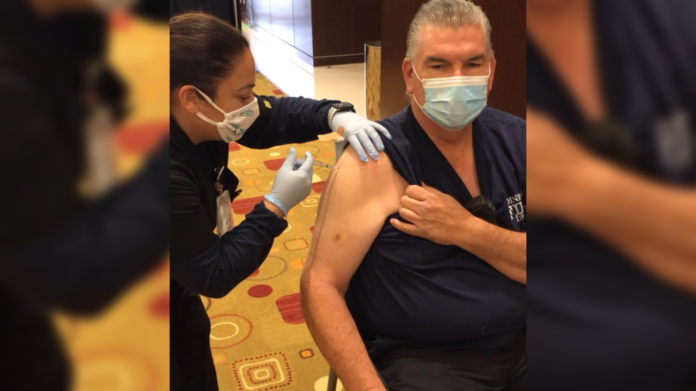
It’s safe for cancer survivors and patients undergoing chemotherapy to take the COVID-19 vaccine, according to a local specialist.
DHR Health oncologist Dr. Lee Drinkard emphasized that those currently fighting cancer are at a higher risk of succumbing to COVID-19 symptoms if they contract the virus since cancer and some related treatments can weaken a patient’s immune system.
The death rate of COVID-19 nearly triples for patients who also have cancer compared to those without, according to a study published by the American Association for Cancer Research, especially for those fighting blood or lung cancer.
Several chemotherapies aim to stop cancer cells from growing, which in turn suppresses the patient’s immune system. However, both the Pfizer-BioNTech and Moderna vaccines which have been approved by the Food and Drug Administration do not contain the live virus, making it unharmful to the immune system of someone with or without cancer.
The vaccines rely on messenger RNA, or mRNA, which carries the genetic coding of the virus and helps the body build a defense against it.
“The vaccine is totally safe for a variety of reasons,” Drinkard said. “First of all the virus is nowhere to be found, it’s just a snippet of the mRNA — it’s never going to be the virus. It’s going to get dissolved as soon as your immune system attacks it. The vaccine will get degraded by the cell by the time you wake up the next day at least, if not sooner.”
What is not known, Drinkard said, is how effective the vaccine is for cancer patients, but since there are no risks of severe side effects, “some protection is better than no protection.”
That is the same attitude Edinburg Fire Chief Shawn Snider had when he took the vaccine in December at the Edinburg Conference Center at Renaissance.
Snider was diagnosed with kidney cancer, renal cell carcinoma, in 2009 when doctors found a 6-pound tumor on his right kidney. He had it removed in a couple weeks after, but another tumor on the upper lobe of his left lung.
He had the entire lobe removed, which left him unable to undergo surgery for the two other tumors that grew on his right lung in 2017, and three others on his pancreas.
With a total of five tumors and around 80% capacity of his lungs, Snider said he did not hesitate to take the COVID-19 vaccines after his doctors told him it was safe.
“They told me ‘As of right now, today, if you have the chance to take that vaccine, you need to take it,’” Snider recalled. “So I said, ‘OK, that’s all I needed to hear.’
“I’m not in the position to doubt, I want to trust the doctor and have no reason to doubt anyone at MD Anderson (The University of Texas MD Anderson Cancer Center in Houston)… We have and know what we do right now, and we have to trust the medical professionals who we have trusted our lives with.”
He added that he did not experience any side effects after getting the first dose of the Pfizer vaccine, and even responded to a fire shorter than half an hour after receiving it. He spent nearly 10 hours fighting that fire and almost forgot he took the vaccine.
“I had no effects from it, and still no effects now,” Snider said. “… I am living proof, I took the vaccine and I had zero effect.”
He said he understands there is no clear research on how effective the vaccine is on people undergoing chemotherapy — for three years now, Snider has been taking chemotherapy pills twice a day, every day.
“My thought process is: ‘Let me get this vaccine for COVID-19, and if I do end up getting exposed because of the high potential of exposure of doing what I do, then maybe my luck is that the vaccine will protect me and the symptoms will not be as severe and I won’t end up on a respirator,’” Snider said.




